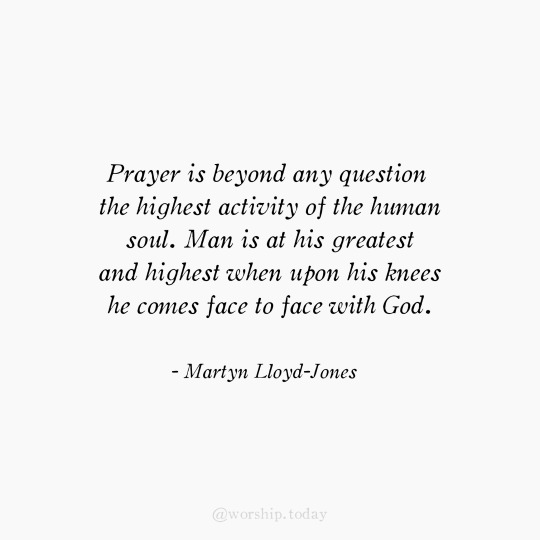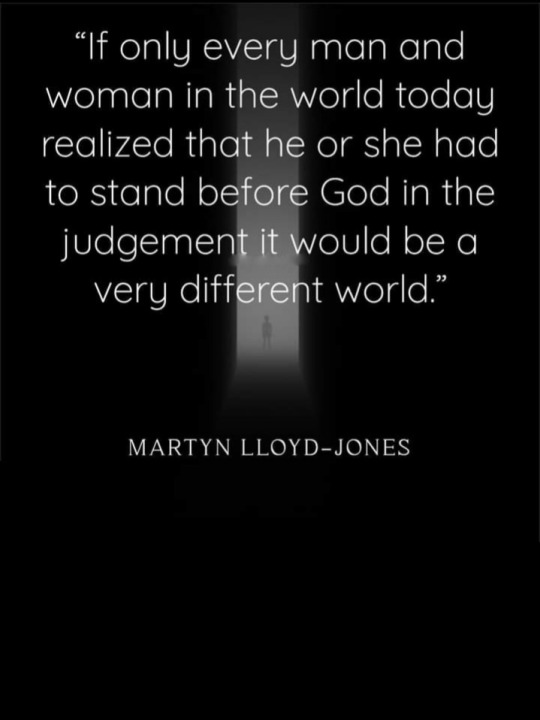#Martyn Lloyd-Jones
Quote
Prayer is beyond any question the highest activity of the human soul. Man is at his greatest and highest when upon his knees he comes face to face with God.
Martyn Lloyd-Jones
98 notes
·
View notes
Text
To judge or not to judge?
Matthew 7:1-6;13-20
“Judge not, that you be not judged. For with what judgment you judge, you will be judged; and with the measure you use, it will be measured back to you. And why do you look at the speck in your brother’s eye, but do not consider the plank in your own eye? Or how can you say to your brother, ‘Let me remove the speck from your eye’; and look, a plank is in your own eye? Hypocrite! First remove the plank from your own eye, and then you will see clearly to remove the speck from your brother’s eye.
“Do not give what is holy to the dogs; nor cast your pearls before swine, lest they trample them under their feet, and turn and tear you in pieces.
“Enter by the narrow gate; for wide is the gate and broad is the way that leads to destruction, and there are many who go in by it. Because narrow is the gate and difficult is the way which leads to life, and there are few who find it.
“Beware of false prophets, who come to you in sheep’s clothing, but inwardly they are ravenous wolves. You will know them by their fruits. Do men gather grapes from thornbushes or figs from thistles? Even so, every good tree bears good fruit, but a bad tree bears bad fruit. A good tree cannot bear bad fruit, nor can a bad tree bear good fruit. Every tree that does not bear good fruit is cut down and thrown into the fire. Therefore by their fruits you will know them.
Many Christians remain forever stuck on those first two words, unable to see that they are indeed meant to judge others. We are commanded to judge the walk of others. For instance, if we see others sinning and we don’t warn them, we will be guilty of their sin (Ezekiel 3:18-21).
Throughout Scripture, we are called to judge. Jesus talked about how we are to judge one’s fruit (verses above). The apostle Paul commanded us not to even eat with false Christians (1 Corinthians 5:11), as well as commanding us to judge inside the church (1 Corinthians 5:12). We are to avoid associating with those whose morals are corrupt (1 Corinthians 15:33) and how can we do that if we’re not judging their walk? And the list goes on and on.
It’s important we must remember our hatred must be directed at sin, not the sinner. As noted by Martyn Lloyd-Jones, “Our anger must only be against sin; we must never feel angry with the sinner, but only full of sorrow and compassion for him.”
The main problem when it comes to judging sin is with those who try to judge indiscriminately. They will easily see the sins of others while often ignoring their own sin. This is true for all of us. We want to see the best in ourselves and the people we like, while easily seeing the error in everyone else.
We must be fair to all, friend and foe alike. The truth is the truth; it cares not if it upsets your friends or foes. We must be willing to stand with God, even if we have to stand alone.
Not to judge someone’s fruit is to invite disaster. We will either let them continue in their sin or allow a wolf among the sheep.
The only way to properly help the lost, and those being led astray by wolves, is to indeed judge people’s fruits. Knowing when, and how, to judge is crucial for a Christian.
#judgment#judgmental#Christians#church#association#friendship#believers#moral#anger#compassion#fairness#stand with God#Bible verses#Bible quotes#Bible study#theology#faith#religion#evangelism#Martyn Lloyd-Jones
170 notes
·
View notes
Text
A Christian who loses his or her temper in an argument should not speak. Whether you prove your point or not you have lost everything by losing your temper.
-Martyn Lloyd-Jones
6 notes
·
View notes
Text

#martyn lloyd-jones#christian quotes#christian quote#christian blog#christian life#christian faith#christian living#christianity
2 notes
·
View notes
Text
What We Need to Understand About Revival
I have been powerfully exercised this evening by the preaching of Martyn Lloyd-Jones mediated to me through the short bio on Lloyd-Jones life by John Piper. I think I will be meditating (and praying on) these quotations for months.
Those people who say that [baptism with the Holy Spirit] happens to everybody at regeneration seem to me not only to be denying the New Testament but to be definitely…

View On WordPress
0 notes
Text

_"Tidak semua yang 'nampak' Kristen adalah Kristen."_ ~ Dr. Martyn Lloyd-Jones
0 notes
Text

0 notes
Text
The nearer a man gets to God, the greater he sees his sin
Martyn Lloyd-Jones
50 notes
·
View notes
Text

#christianposts#christian living#dailydevotion#bibleverse#daily devotional#theology#christian quotes#christianity#scripture#faith#martyn lloyd jones
2 notes
·
View notes
Text
Amigo, cuidado para que você não acorde na eternidade somente para ouvir Cristo dizer-lhe: "Apartai-vos de mim, nunca vos conheci".
Martyn Lloyd Jones
103 notes
·
View notes
Quote
I do not know what you feel, but I never cease to be grateful to these disciples. I am grateful for the record of every mistake they ever made, and for every blunder they ever committed, because I see myself in them. How grateful we should be to God that we have these Scriptures, how grateful to Him that He has not merely given us the gospel and left it at that. How wonderful it is that we can read accounts like this and see ourselves depicted in them, and how grateful we should be to God that it is a divinely inspired Word which speaks the truth, and shows and pictures every human frailty.
Martyn Lloyd-Jones
#Apostles#Holy Scriptures#Bible (divinely inspired)#God#gratitude#human frailty#Martyn Lloyd-Jones#Christian Quotes
85 notes
·
View notes
Text
The theology of C.S. Lewis
C.S. Lewis is someone who is often quoted on social media. No matter how solid a brother and sister in Christ might be, it seems Lewis always gets quoted by them. His books are sold in many respectful Christian conferences. In many seminaries, some of his books are mandatory to read. Is he, therefore, someone we should read without hesitation?
Martyn Lloyd-Jones sounds off the alarm
One of Lewis' friends, pastor Martyn Lloyd-Jones, warned others that “Lewis was essentially a philosopher” and not a theologian. Why did Lloyd-Jones say that? Because, as Martyn Lloyd-Jones noted: “(1) Lewis taught and believed that one could reason oneself into Christianity; and (2) Lewis was an opponent of the substitutionary and penal theory of the Atonement.” The former is a cause to concern, seeing that it goes directly against Romans 8:7, but the latter is to completely deny the Christian faith.
Inclusivism
Lewis was an inclusivist. He believed that faith in Christ is not necessary for salvation, and all worship, no matter the religion, eventually leads to the same destination: the Christian God — even if the people in other religions don’t know/realize it. He wrote:
There are people in other religions who are being led by God’s secret influence to concentrate on those parts of their religion which are in agreement with Christianity, and who thus belong to Christ without knowing it. For example a Buddhist of good will may be led to concentrate more and more on the Buddhist teaching about mercy and to leave in the background (though he might still say he believed) the Buddhist teaching on certain points.”
He came to this conclusion when he considered all the people of the world who had died before the incarnation of Christ. He wrote: “Many of the good Pagans long before Christ’s birth may have been in this position [that is, saved].”
Prayers to false gods
Since God is merciful, Lewis believed that God would accept worship from everyone, and that meant He’d also listen to all prayers. Lewis wrote: “I think that every prayer which is sincerely made even to a false god or to a very imperfectly conceived true God... is accepted by the true God and that Christ saved many who do not think they know Him.”
While visiting Greece with his wife, he was very tempted to pray to a false god. After all, for Lewis, someone can be heard by the Christian God if they pray to any false god. He wrote: “I had some ado to prevent Joy (and myself) from relapsing into Paganism in Attica! At Daphni it was hard not to pray to Apollo the Healer. But somehow one didn't feel it would have been very wrong — would have only been addressing Christ sub specie Apollinis.”
Genesis, Jonah, and Esther
For Lewis, the Old Testament wasn’t a reliable source of history because it was either pagan stories or purely poetic. As a matter of fact, for Lewis, the Bible didn't start to be real history until the New Testament. Lewis wrote:
The earliest stratum of the Old Testament contains many truths in a form which I take to be legendary, or even mythical—hanging in the clouds, but gradually the truth condenses, becomes more and more historical. From things like Noah’s Ark or the sun standing still upon Ajalon, you come down to the court memoirs of King David. Finally you reach the New Testament and history reigns supreme, and the Truth is incarnate.
He also could not believe in the book of Jonah, or Esther, as being real stories. He wrote:
The point is that the whole Book of Jonah has to me the air of being a moral romance, a quite different kind of thing from, say, the account of King David or the New Testament narratives, not pegged, like them, into any historical situation. In what sense does the Bible 'present' the Jonah story 'as historical'? Of course it doesn’t say, 'This is fiction,' but then neither does our Lord say that the Unjust Judge, Good Samaritan, or Prodigal Son are fiction (I would put Esther in the same category as Jonah for the same reason).
Evolution
Because his views of Genesis were flawed, he also believed in theistic evolution. He wrote:
For long centuries God perfected the animal form which was to become the vehicle of humanity and the image of Himself… The creature may have existed for ages in this state before it became man: it may even have been clever enough to make things which a modern archaeologist would accept as proof of its humanity. But it was only an animal because all its physical and psychical processes were directed to purely material and natural ends. Then, in the fullness of time, God caused to descend upon this organism, both on its psychology and physiology, a new kind of consciousness which could say ‘I’ and ‘me,’ which could look upon itself as an object, which knew God, which could make judgments of truth, beauty, and goodness, and which was so far above time that it could perceive time flowing past.
Purgatory and praying for the dead
Lewis held to certain Catholic beliefs. For instance, he believed in purgatory and praying for the dead. He wrote:
Of course I pray for the dead. The action is so spontaneous, so all but inevitable, that only the most compulsive theological case against it would deter me. And I hardly know how the rest of my prayers would survive if those for the dead were forbidden. At our age, the majority of those we love best are dead. What sort of intercourse with God could I have if what I love best were unmentionable to him? I believe in Purgatory. I assume that the process of purification will normally involve suffering. Partly from tradition; partly because most real good that has been done me in this life has involved it.
No literal, or eternal, hell
For Lewis, hell wasn’t a place where there “shall be weeping and gnashing of teeth,” but rather he believed those in hell would “enjoy forever the horrible freedom they have demanded, and are therefore self-enslaved."
Lewis couldn’t tell how long someone would be stuck in this made-up hell. He wrote: “[The Bible] usually emphasizes the idea not of duration but of finality... but whether this eternal fixity implied endless duration–or duration at all–we cannot say.”
Lewis also talked about a possible version of hell where you are stuck in a solitary existence — a self-imposed mental prison while in purgatory. He wrote: “Whether [hell] being left to a purely mental existence, left with nothing at all but one's own envy, prurience, resentment, loneliness & self conceit, or whether there is still some sort of environment, something you could call a world or a reality, I never pretend to know.”
The existence of the devil is unimportant
For Lewis, whether you believe in the devil or not, is unimportant. He wrote: “No reference to the Devil or devils is included in any Christian Creeds, and it is quite possible to be a Christian without believing in them.”
The Bible has errors and contradictions
In various publications, he expressed the idea that the Bible is not without error; he didn’t believe in the inerrancy of Scripture. He believed the Bible was inspired by God, but there are errors are within Scripture. He wrote:
The main difficulty seems to me not the question whether the Bible is 'inspired,' but what exactly we mean by this. Our ancestors, I take it, believed that the Holy Spirit either just replaced the minds of the authors (like the supposed 'control' in automatic writing) or at least dictated to them as to secretaries... Errors of minor fact are permitted to remain.
Regarding certain events found in Scripture, even though he believed they were wrong, he still held the opinion such events were at least close to reality. Lewis wrote: "Either this is reportage—though it may no doubt contain errors—pretty close up to the facts... If it is untrue, it must be narrative of that kind. The reader who doesn't see this has simply not learned to read.”
When talking about the contradictions, or accurate portrayal of history, in the Bible, Lewis wrote: "Naïvety, error, contradiction, even (as in the cursing Psalms) wickedness are not removed. The total result is not 'the Word of God' in the sense that every passage, in itself, gives impeccable science or history.’” And because the Bible can't be trusted to properly describe historical events, we should not be "using it as an encyclopedia or an encyclical.”
Jesus was capable of errors
Lewis believed that for Jesus to be truly human, He had to have made mistakes and committed sins — especially when He was young, for Lewis believed that Christ came to understand His divinity as He grew up. For Lewis, a sinless Christ would make Him less capable of understanding us. He wrote: “Was our Lord himself incapable, qua Man, of such errors? Would it be a real human incarnation if he was?”
And last but not least, one of the worst takes from Lewis regarding Jesus. He wrote:
It is clear from the New Testament that [the first Christians] all expected the Second Coming in their own lifetime. And, worse still, they had a reason, and one which you will find very embarrassing. Their Master had told them so. He shared, and indeed created, their delusion. He said in so many words, 'this generation shall not pass till all these things be done.' And He was wrong. He clearly knew no more about the end of the world than anyone else.' It is certainly the most embarrassing verse in the Bible.
Lewis believed that the fact that Jesus was wrong, and that embarrassing errors said by Jesus were never removed from the Bible, is proof that the New Testament can be relied on as true historical events. Lewis wrote: “This passage (Mark 13:30-32) and the cry 'Why hast thou forsaken Me?' (Mark 15:34) together make up the strongest proof that the New Testament is historically reliable.”
Conclusion
C.S. Lewis is one of the most well-known names in Christianity. Narnia is a book (turned into movies) that is loved by not only Christians but unbelievers alike. His theological books are recommended by false and solid teachers alike. However, the man behind Narnia held to some very dangerous beliefs and we must be aware of them. Be aware of the dangers that often go unnoticed in Lewis’ writings. Always guard your heart when reading the literary works from anyone who isn’t a Christian.
#C.S. Lewis#Martyn Lloyd-Jones#theology#Reformed theology#doctrine#Jesus Christ#Word of God#The Bible#Scripture#Christian quotes#apostasy#heresy#Christianity#faith#religion#Christians#Narnia#The Screwtape Letters#Biblical contradiction
50 notes
·
View notes
Text
I know no Christ except the Christ who had to die for me and my sins upon the cross. I have no access to the Father except by the blood of Jesus.
-Martyn Lloyd-Jones
10 notes
·
View notes
Text
When considering a prospective husband or wife:
The most vital question to ask about all who claim to be Christian is this: Have they a soul thirst for God? Is their life centered on Him? Do they press forward more and more that they might know Him?
Martyn Lloyd-Jones
37 notes
·
View notes
Text

"Prayer is beyond any question the highest activity of the human soul. Man is at his greatest and highest when upon his knees he comes face to face with God."
Martyn Lloyd-Jones
67 notes
·
View notes
Text

_"Jika setiap pria dan wanita di dunia sekarang menyadari bahwa mereka kelak berdiri di depan penghakiman Allah maka dunia akan berbeda."_ ~ Martyn Lloyd-Jones
0 notes